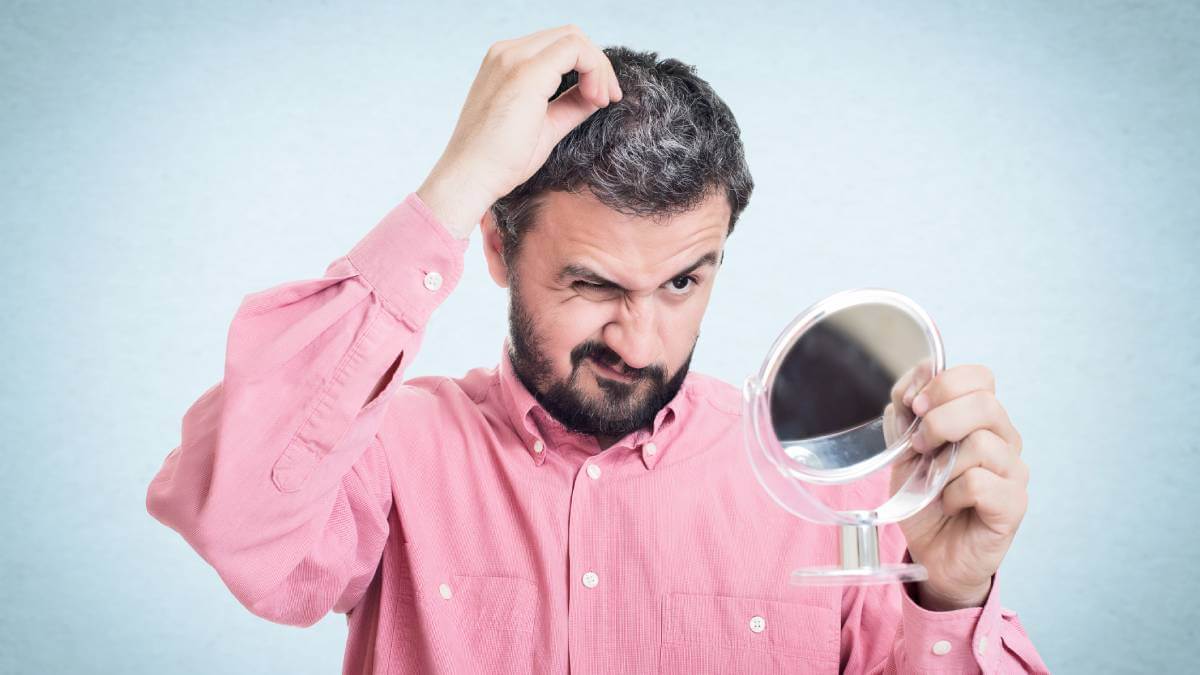If you’ve reached a certain age in life, you probably remember the first time you noticed a grey hair. Going grey is a completely natural part of the ageing process, and it happens to most of us, but it can still be a shock to see your beloved natural hair shade changing colour over time.
Most of us start to notice the first few greys creeping into our hairline by the time we hit our early 30s, but for some people, the process can start much earlier.
Why does hair turn grey?
The idea that stress turns your hair grey is a myth. In fact, hair doesn’t ‘turn’ a specific colour overnight. Once a hair follicle produces hair in the scalp, the colour is set for the rest of its growth. A single hair grows for one to three years, then you shed it – and grow a new one. As you age, your new hairs are more likely to be white.
To understand why hair goes silver, it’s important to understand why it has colour in the first place. The answer lies in a special type of cell known as a melanocyte, which produces melanin pigments as they grow into the hair fibre.
Melanin comes in two forms, eumelanin (black or brown) and pheomelanin (reddish-yellow). Combinations of these two create the spectrum of natural human hair colours that we’re all familiar with: blonde, brown, black and red.
“Melanin-producing cells at the base of each hair follicle feed pigments through to the hair root,” says Dr Sarah Brewer, author of Eat Well, Look Great. “If you produce red melanin, you will have gold, auburn or red hair, while black melanin produces shades of brown or black, depending on its concentration.”
As we get older, the pigment-producing melanocytes in our hair follicles gradually lose their ability to create melanin. When there are fewer pigment cells in a hair follicle, a strand of hair will appear more transparent as it grows, appearing grey or silver in colour against your natural hair colour.
Genetic factors appear to be important in determining when we turn grey. Identical twins seem to go grey at a similar age, rate and pattern, however, we’re yet to identify the controlling genes.
Can my diet help?
Experts believe that a good diet can help to ward off the white. “Premature greying of hair has, in particular, been linked with a lack of certain B vitamins, folic acid or copper,” says Dr Brewer.
She suggests upping your vitamin B5, also known as pantothenic acid or pantothenate, to safeguard your locks. “It’s found in wholegrains, beans such as edamame, lentils and beansprouts, vegetables such as broccoli, dark green leaves, avocado and tomatoes.”
Incorporating good sources of vitamin B12 can be helpful too, like liver, kidney, oily fish – especially sardines – red meats, white fish, eggs and dairy products.
“Green leafy vegetables and wholegrains are high in folic acid. And seafood, nuts, beans, wholegrains, avocado, artichokes, radishes, garlic and mushrooms are high in copper,” says Dr Brewer.
“Reishi, the mushroom of immortality, boosts blood flow to the peripheries and promotes the growth of healthy, glossy hair.” It’s an ancient Chinese remedy for premature hair greying and is usually drunk as a herbal tea. It can be bought in most health food shops.
Dr Brewer says that a good general rule is to follow a wholefood, nutrient-rich diet – avoid processed, convenience foods, and those with a lot of added salt to keep hair in good nick.
Should you dye grey hair?
Many people find that dyeing their hair is the easiest way to keep greys hidden, although there has been a recent cultural shift in both women and men embracing their natural grey hair, thanks to celebrities like Katie Holmes, George Lamb and Helen Mirren.
If you do want to dye your hair, it’s always a good idea to be mindful about what you’re applying to your body. “Chemicals found in hair dyes can often irritate skin and cause an allergic reaction,” warns Dr Brewer.
She suggests talking to your hairdresser about the types of dyes they use, and selecting those they are confident are the most gentle and natural, such as herbal extracts like rosemary and cinchona.
Do you dye your hair, or have you embraced going grey? Let us know in the comments section below.
Also read: How to keep grey hair looking healthy
– With PA


My late, lovely dad’s hair was fully white in his 20s. I started to find a lot of white hairs in mine when I was in my teens. Being that age I colored my hair almost every color I could, until I reasoned it wasn’t helping as I just kept getting more and more white hairs. I was completely white in my 30s and have been complimented all the time about my lovely white hair. Many women pay a lot of money to get my hair color but I’m just lucky to be naturally white.
I’m now 79 and I love my hair color now. Even my hairdresser tells me how lucky I am.
Every time I see an advertisement for hair colour I wonder what our third world concern would look like to a culture battling food shortages, war, etc. “Silver” or grey is a good look, vanity not so much.